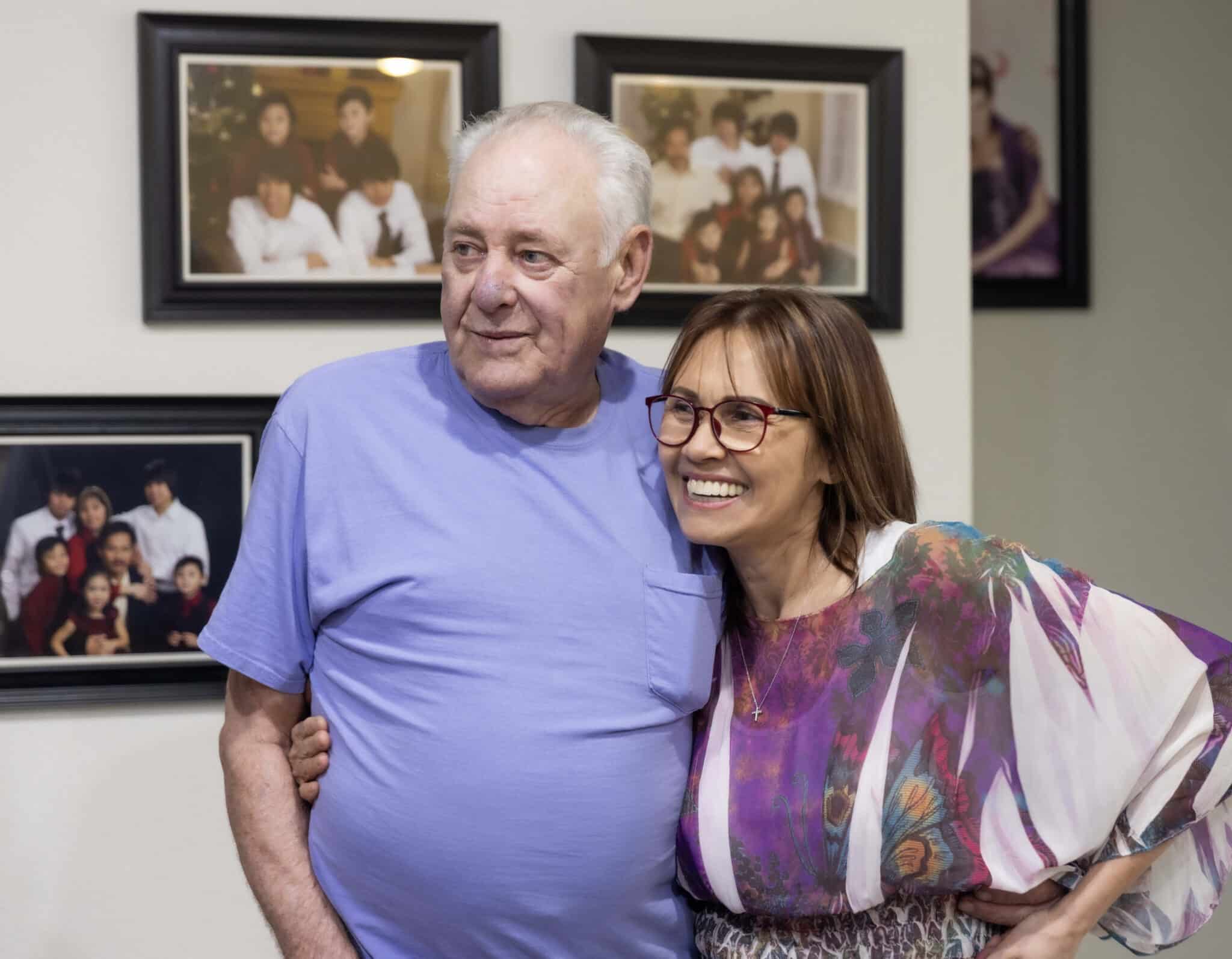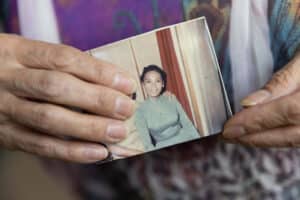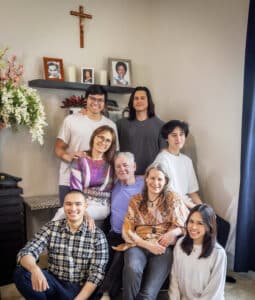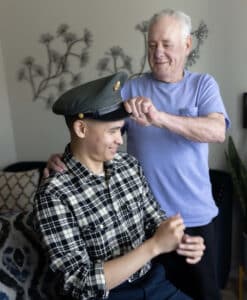
Finding father: Fort Worth woman completes a lifelong journey
By Linda Blackwell Simmons
Photography by Jill Johnson
In the late afternoon on Friday, Dec. 2, 2022, Linda Mai Pho was driving home to north Fort Worth from her job as a hairstylist on the city’s Near Southside when her cellphone rang. The caller was from a Massachusetts area code she didn’t recognize.
“Linda?” the caller asked.
“Yes, who is this?” she responded.
“This is your father.”

William Banks holds a picture of Ha Nguyen, Linda Mai Pho’s mother.
It’s a mild morning in late March when William Banks, 78, Linda’s father, lands at DFW Airport on a flight from Boston, his first time in Texas. Linda had visited her father for the first time in Massachusetts over Christmas. But this will be the day Linda grants her father the most precious of all gifts — the family he hoped for but long ago decided wasn’t to be.
“It’s a gift from God to introduce my father to his grandchildren,” Linda, 55, says.

Linda Mai Pho and husband Minh Pho help prepare dinner for their family reunion in March.
The rainy season had begun, and during the late afternoon of June 17, 1968, in Cholon, South Vietnam, the downpour lasted for hours. But Ha Nguyen, a 24-year-old single woman, was unconcerned. Accompanied by a helper, she gave birth to a baby girl. That same day, Ha gave her baby an American name: Linda.
“Soldiers were everywhere,” Ha told her daughter about that day. “It rained every day, usually in the afternoon. On the day you were born, the noise pounded — with grenades and weapons.”

Linda’s son Johnny, 23, accompanies her to DFW Airport. Grandfather and grandson have a common bond. Both are the thirdborn of four boys, and both have military service in common, with Johnny about to deploy with the Army to Kosovo. Together, the three drive to her comfortable suburban home, where Linda’s husband, Minh Pho, and the couple’s other four almost-grown children wait. These are William’s grandchildren — grandchildren he never knew about until he received a letter last November.
There’s also an unexpected bonus waiting at Linda’s home, a surprise especially for William. Denise Banks — his 48-year-old daughter and Linda’s newly found half-sister — and a friend have driven from Northern California to Texas, making the long trip with only an overnight stop in Albuquerque, New Mexico. Denise has not seen her father in several years.
“My father called me late one evening last November and seemed unusually tongue-tied,” she says. “He said nothing at first, and then I heard a deep breath. ‘You have a sister.’ It took me a few days to come to terms with it. He told me not to contact her yet because he wanted to do a little investigating. I looked her up on Facebook and called my dad and told him that no further research is needed. She is my sister. She has that ‘Banks’ smile.”
Suddenly, heads turn. Laughter and voices become pronounced.
“Danny’s here.” Linda’s youngest son, a little taken aback by all the attention, arrives from Arlington, where he was taking college classes that day. The family is now crystallizing
“Linda and Minh have done a hell of a job with these kids, with all the struggles they went through to get to America, especially the discrimination Linda endured in Vietnam,” William says as he dotes on his four grandsons and one granddaughter, their smiles strikingly similar. “I’d like to think that maybe I somehow contributed something positive to all their achievements.”
In addition to Johnny, there’s Phi, 33, who works for a finance firm here; Sidney, 30, who is a software engineer and lives in Dallas; FEATURES William Banks holds a picture of Ha Nguyen, Linda Mai Pho’s mother. Danny, 19, who studies math at the University of Texas at Arlington and tells his mom he just aced his calculus test; and Leslie, 17, who is a senior in high school.
Sitting in their living room — Linda, Minh Pho, their five children, William and Denise — the chatter is easy and spirited, the humor garnished with tender warmth, the new family catching up on decades.
“Linda calls me Father and sometimes Daddy. She pats me on the head a lot. I think she should call me Puppy,” William says, smiling.
“Father, be careful what you say,” Linda says. “They eat dogs in Vietnam.”
Denise begins to talk about her life. She is neither married nor has children. She clearly has much affection for her father, and he for her.
“All my adult life, I wanted marriage and children, but it never happened,” she says. “My father always wanted a larger family, but I never gave him any grandchildren. Linda and her children are the family he didn’t have. And I am deeply happy to be a sister and an aunt — I plan to be a good one given the opportunity. The last few months when anybody asks me how I am, I answer, ‘I’m good. I got a sister last Christmas.’”
“I wish that Linda had found me 30 years ago,” William says. “Life could have been different. But that’s OK. We have each other now.”
One might expect tension, perhaps unease, but instead, all seem to dance to their own tune in harmony with the rest. Dinner starts under a kitchen plaque that says, “Family, Home, Love and Faith.”
With furniture moved for photographs, family members gently jostle for pictures. William, with a smile, speaks one of the few phrases he recalls from Vietnam — “di di mau.” Hurry up.
Family members use this command during the remainder of William’s visit — spoken in jest, bringing the family even closer.
As the day wanes, the mood becomes more somber. William and Johnny huddle in a smaller room, sitting beneath a wall of family photos. Shoes are neatly placed in a bin by the front door. Outside shoes are never worn in the home.
“Johnny’s about to go around the world to a country he doesn’t know — just like I did all those eons ago,” William says as he dons his military hat from Vietnam. Soon, he places it on Johnny’s head, each looking at the other. Johnny’s eyes fill with tears.
“I was about 15 when I knew I wanted to join the military,” Johnny says. “I always felt like my American grandfather who had fought in Vietnam, whoever and wherever he was, had somehow in some small way contributed to my mother and grandmother being able to come to this country.”
For as long as she can remember, Linda has known that her father was an American serviceman and this is as much as she has been able to tell her children about their grandfather.
“When I look at you, I see a good man — an honesty, a gentleness, I see my face, I see myself,” Linda says. “The past is the past. Now I just look forward to enjoying having you in my life. God gave you to me. I’m filled with joy and grateful. I love you my father William.”

(Left to right) Leslie Pho, Danny Pho and the wives of Sidney Pho and Johnny Pho, with Denise Banks, William Banks and Linda Mai Pho.
The Vietnam conflict raged for years. Alone with her unborn baby, Ha found the will to survive.
Her parents and grandparents had passed away. Ha’s elderly paternal great-aunt, Aunty Tram, took in Ha and Linda. Ha worked at various jobs to help provide for her small family.
In 1973, when Linda was 5, she began school, but it brought obstacles and worries. Linda was blond and light-skinned, features of the foe.
“You mixed,” classmates mocked her, thumping Linda on the head. Ha pulled Linda out of school when she was 6.
When she wondered about her father, Linda always heard the same answer. “He’s dead,” Ha would say.
When Saigon fell in 1975, Ha and Linda were stuck inside Vietnam.
“I was 6 in 1975, during the fall of Saigon, when my mother and I were standing outside the gates of the American Embassy trying to join the rooftop evacuation to a better place,” Linda says. A guard “told my mother she didn’t have enough money. Soon all the helicopters were gone.”
Finally, in 1983, Ha and Linda came to the United States through Catholic Charities’ refugee program. Catholic Charities sponsored them for about six months in Dallas, providing a one-bedroom apartment and finding Ha a job in a print shop.
Linda, who caught up in math and other subjects and learned English, graduated from North Dallas High School. In 1985, they moved to Fort Worth, where she met and married Minh Pho, a refugee who escaped Vietnam on a boat. Until Ha died in 2010 at 66, she lived with Linda and her family.
“I am very proud of my mother,” Linda says. “She had a miserable life, always sacrificing for her child. She grew up with her cousins, all orphaned children. She never married. I know I am very fortunate to have a mother and family who loved me regardless of my mixed race.”
Still, questions about her father persisted. “In all of these years, especially my teens, I wanted to know more than anything about my father,” she says. “What did he look like? Was he a good man?”
Linda read about the phenomenon of DNA and its ability to connect. But she was afraid. What if she found her father and he was dead? What if he rejected her? In fall 2021, she submitted her DNA to the Ancestry.com database. She waited. No matches.
“I decided I did not have the genealogy knowledge to do this search by myself,” she says. “So I hired an expert.”

The blended family of William Banks and Linda Mai Pho comes together for a reunion in March: Front row, left to right, Johnny Pho, Denise Banks, Leslie Pho; middle row, Linda Mai Pho, William Banks, Danny Pho; rear row, Sidney Pho, Phi Pho
William Banks was born Oct. 28, 1944, in his childhood home in the farming community of Stow, Mass., about 30 miles west of Boston. The family-owned 46 acres, on which they raised cattle, horses and chickens and grew corn, mostly for the family. William was the third of five children, four boys — Archie, George, William and Kenny, and a baby sister, Deborah. William’s father worked at a woolen mill and also owned a cement company, while his mother tended the family.
After graduating from high school, William remained local and for a year or so, driving a truck part-time and doing other odd jobs. But soon, Southeast Asia called. He received a draft notice, ignored it and instead enlisted in the Army. After boot camp at Fort Dix, N.J., the other recruits headed to California, where they boarded a plane — first to Alaska, then to Japan, both stops en route to Vietnam, a country William knew nothing about.
“Funny what we recall, but when I first boarded that plane in California, there was a flight attendant I had known from Acton, a nearby town in Massachusetts,” he says. “She had been a cheerleader at some of our school athletic events. Although it had been a few years, we recognized each other. We began chatting, but then she suddenly broke out in tears. I couldn’t figure out why, what had I done, but then she said I was the first boy she knew who was going ‘over there.’ I think it hit home to her.”
William arrived in South Vietnam in October 1966 and was based in Long Binh, 22 miles outside of Saigon. Long Binh was an Army logistics and command center and, at its height, home to 60,000 American soldiers.
“Most of South Vietnam was wet and green with foliage, but the terrain around Long Binh was barren, no color,” he says. “The Army had sprayed Agent Orange to defoliate much of the surrounding countryside to prevent snipers from using the plants as cover.”
The base offered restaurants, snack bars, barbershops, post offices, coin laundries, tennis courts and swimming pools.
William, a member of the 103rd Engineer Battalion, early on became FEATURES known as the man who could “fix anything.” He and his crew worked on machinery, repaired weapons and paved roads. He entered the military as a private and came out a year later as a sergeant, with 14 men reporting to him. His fellow soldiers became buddies and worked long hours.
“Whiskey was cheap, beer was prevalent, and women were abundant,” he says. “It was like the Wild West — pop-up saloons were everywhere. Soldiers would buy the women drinks at drink prices, but usually the women were drinking iced tea. Times were not good for them. Women and babies were hungry. There was no work, no money.”
William vaguely recalls a young woman and “that green dress.”
“It was a late summer/early fall relationship in 1967, maybe what you call a fling,” he says. “She was a beautiful girl. They called it the ‘Summer of Love’ in the States. Then in October, I got sick with an infection and had to leave Vietnam that fall, a year after I arrived.”
William returned home to Massachusetts, and, like many others who served in Vietnam, tried to move on. At times over the decades, survivor guilt plagued him, he says.
“Even today, when I go to a restaurant, I try to sit in the corner where I can see the exits, both front and back,” he says. He still carries a gun back home.
About eight months after he returned to Massachusetts, William met a woman named Diane. They got married in 1970, and in 1975, she gave birth to their daughter, Denise. The couple divorced in 1995.
“After Diane and I divorced, I dated on and off throughout the years, but I never married again or had a serious relationship,” he says.
William has lived the majority of his life in Stow — simply, in a quiet apartment. His brother George has passed away, but he remains close to Archie, the oldest, and Kenny, the youngest.
Just before Thanksgiving, in November 2022, Archie received a letter.
Archie was the only one of the Banks brothers who had provided his DNA to Ancestry. The Banks family immigrated to Nova Scotia in the 1600s and eventually moved to Massachusetts, and Archie wanted to know if he could take his line back further if he provided his DNA.
The letter, from Linda, explained that an ancestry professional conducted research that identified him as a close relative. And Linda provided pictures, dates and other information to help substantiate who she was. Mostly, she stressed she wanted only to meet and know her father. She shared that her mother had passed away.
After a few days ruminating, Archie took the letter to William’s apartment.
“What? No way,” William responded.
A couple of days later, he finally opened the letter. He saw the pictures, dates and other details Linda provided, including a picture of Ha in the green dress. “DNA doesn’t lie,” William later told his daughter.

“I hoped and dreamed one day of being able to meet my biological father.” — Linda Mai Pho’s letter to the brother of William Banks in fall 2022, trying to find her father.
They called each other and called again, trying to catch up on half a century of news. William told his ex-wife, Diane, that he was driving to Boston’s Logan Airport to pick up Linda.
“Not without me you aren’t,” Diane said. Her current husband, Tony, wanted to go, too.
Over three days in Stow, the family absorbed all they could about each other, and William, now 78, walked Linda around downtown Stow to his favorite coffee shops and diners.
“This is my daughter, Linda,” he told friends, introducing her.
“Welcome,” they said.
William has a daily routine, starting with his morning walk of a few blocks to downtown, where he eats lunch. He returns home late in the afternoon. If Linda wants to reach him, he has told her, call before he leaves the apartment or after he has returned. But call after 7 p.m. and it’s likely he has indulged in a couple of glasses of whiskey.
Just before Linda returned to Texas, she saw her dad’s military uniform hanging in his closet. She asked if she could take it to Johnny.
“I am proud to pass it on to Johnny, who will carry it forward,” William says. “I used it years ago when I participated in VFW events and parades, but it’s been hanging in my closet for years. My newfound grandson said maybe he would shadowbox it.”
Linda visited her father again in Massachusetts over Father’s Day, another surprise gift. William now has pictures of Linda and his five grandchildren on his refrigerator, reminding him every day he has a larger family than he knew.
“So many adult children have fathers who are good, whom they know, and have had their whole lives with them, but perhaps they may not realize what they have until it’s too late,” Linda says. “It’s made me so happy to finally have my father in my life, even if it did take me 54 years to find him.
